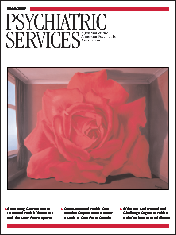A Randomized Trial of a Brief HIV Risk Reduction Intervention for Men With Severe Mental Illness
Abstract
OBJECTIVE: A six-session version of a longer, 15-session social skills intervention for reducing high-risk sexual behaviors among men with severe mental illness was assessed. METHODS: Ninety-two men were randomly assigned to the intervention or to a two-hour standard HIV educational session, and their sexual risk behaviors were assessed every six weeks for six months. RESULTS: Among the sexually active men (33 in the intervention group and 23 in the control group), a twofold reduction in sexual risk behaviors was found for the intervention group. This reduction was less than the threefold reduction seen for the original 15-session intervention and was not statically significant. CONCLUSIONS: Further study is required to determine the optimal balance between efficacy and feasibility of this intervention.



